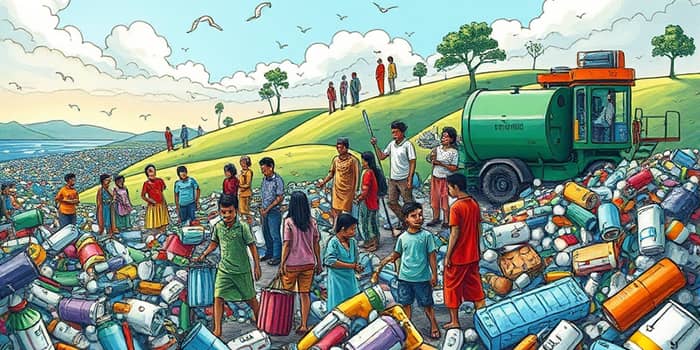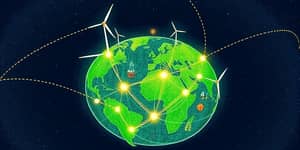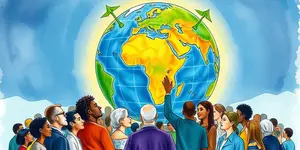Plastic has become an indispensable element of modern life, fueling innovation but also generating a growing environmental crisis. Despite widespread awareness, stagnant recycling rates that persist highlight a system under strain. This article explores why recycling alone cannot solve the plastic pollution crisis and outlines a path toward meaningful change.
Global plastic production soared to 400 million tonnes in 2022 and is set to double by 2050. Yet only around 9–10% of that waste is recycled each year. The result is a mounting mountain of plastic in landfills, incinerators, and our natural environment.
The scale of plastic production and recycling
Over the past few decades, plastic production has escalated at an unprecedented pace. In 2018 the world produced 360 million tonnes of plastic; by 2022 that number reached 400 million tonnes. Meanwhile, recycling rates have barely budged, locked at around 9%.
Most new plastic is derived from virgin fossil fuels, rather than recycled content. Without major intervention, global mismanaged plastic waste could nearly double by 2040. This reality underscores the overwhelming scale of production and the urgent need to rethink our approach.
Technical and economic barriers
Recycling faces a host of inefficiencies. Plastics come in multiple polymer types that require separate processing. Contamination during collection and sorting often renders material unrecoverable. Even when plastic is collected, only about half of it is actually recycled; the remainder is incinerated or landfilled.
The economics of recycling also present formidable obstacles. Virgin plastic, backed by low fossil fuel prices and industry subsidies, remains cheaper to produce than recycled material. Without policy incentives, the economic viability of recycling remains fragile.
- High costs of collection, sorting, and cleaning
- Low market value for recycled resins
- Complex polymer mixtures and contamination
Environmental and health impacts
The failure to recycle effectively has profound consequences. Plastic debris accumulates in oceans, rivers, and soils, breaking down into microplastics that are now found in the deepest ocean trenches, mountain snow, and even inside living organisms.
Microplastics have been detected in human blood and breast milk, raising concerns about long-term health effects. Meanwhile, open burning and poorly managed landfills in low-income countries expose communities to toxic fumes and hazardous chemicals.
These outcomes underscore the urgent need for action at every level—from individuals to international bodies—to stem the tide of plastic pollution.
Beyond recycling: comprehensive solutions
Recycling alone cannot address the root causes of the plastic crisis. A broader strategy must include:
- Source reduction through product redesign and packaging minimization
- Extended producer responsibility schemes to shift waste costs onto manufacturers
- Investment in advanced mechanical and chemical recycling technologies
Progress in chemical recycling offers promise, but regulatory clarity and scale‐up challenges remain. Governments can drive change through clear mandates, subsidies for recycled content, and penalties for excessive plastic use.
Charting a path forward
Turning the tide on plastic pollution demands a collaborative global effort is essential. Governments, corporations, and consumers must work in concert to:
- Reduce plastic at source by embracing minimal, reusable, or compostable materials
- Transform plastic waste into resources through innovative recycling and circular economy models
- Empower communities with education and local collection systems
Businesses must lead by redesigning products for durability and recyclability. Communities can champion local bans on single-use plastics and support refillable and bulk purchasing initiatives. Citizens can demand transparency from brands and make conscious choices that favor sustainable alternatives.
Ultimately, we must redefine our relationship with plastic—viewing it not as disposable trash but as a material deserving of respect and care. Only through concerted action can we ensure plastic serves society without imperiling our planet.
The challenge is immense, but so is human ingenuity. By tackling production at its source, closing material loops, and fostering a culture of reuse, we can steer toward a future where plastic waste is no longer a global burden but a resource for innovation. The time for decisive, holistic action is now.
References
- https://plasticsrecycling.org/resources/2025-plastic-recycling-capacity-in-the-us-and-canada/
- https://thesustainableagency.com/blog/recycling-facts-and-statistics/
- https://resource-recycling.com/plastics/2025/03/22/five-trends-for-plastic-recycling-in-2025/
- https://phys.org/news/2025-04-global-plastic-recycling-stagnant.html
- https://www.soci.org/news/2025/4/plastics-recycling-rates-are-stagnating-heres-why
- https://luxresearchinc.com/blog/the-state-of-advanced-plastic-recycling-2025/
- https://news.climate.columbia.edu/2020/03/13/fix-recycling-america/
- https://www.breakfreefromplastic.org/2025/06/16/plastic-production-is-the-real-problem/










